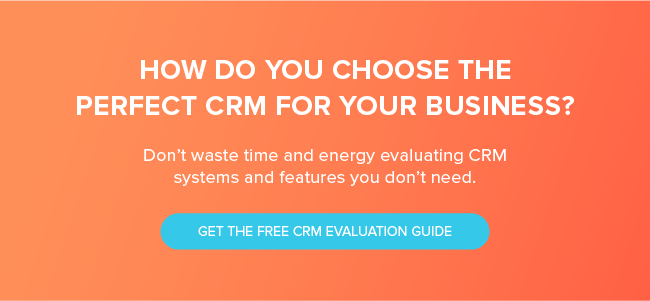
It’s old news that more than 60% of all CRM implementations fail. This figure ought to keep sales managers up at night, because it means that every day, thousands of sales teams are expected to perform with their technological house out of order.
Companies must choose their CRM based on the needs of their stakeholders in their organization. Just as marketing teams create buyer personas to represent segments of the market, sales leaders should examine the needs of their end users when choosing a software platform.
The end users of CRM software are sales reps. However, more often than not, sales managers’ priorities are prioritized over reps’. Of course, providing all stakeholders -- managers, operations, marketers, and reps -- with the tools they need is a critical facet of any CRM system. But sales leaders have to find and configure systems that fulfill these disparate needs while still providing for their primary function: Supporting individual salespeople.
Complexity Affects Different Groups Differently
Charting a path forward requires some serious strategizing. No matter what advanced features your company needs from its CRM, it’s imperative that your sales team isn’t bottlenecked by complexity and prevented from accessing the tools they need most. Every user and every team has a different tolerance for complexity in their software systems.
Salespeople who often need to access client information quickly and occasionally under difficult circumstances have a very low tolerance for complexity in their system. In contrast, managers, marketers, and other power users, have a much higher tolerance for complexity in their software because they’re used to working with deeper insights from aggregated reports. Understanding where your end users fall in this continuum is essential to a proper purchase decision. Choosing a CRM (or any software for that matter) is about providing power users with the advanced features they need while shielding vulnerable users from additional complexity.
Understand Your Users
Sales leaders need to be especially cognizant of their reps’ time. A sales team’s productivity depends on being able to eliminate complexity and extraneous activities. This need for simplicity unsurprisingly is mirrored in the CRM system. Salespeople spend so much time every day using their CRM that even small complexities in the experience can have outsized impacts on their overall productivity.
Other users like marketers and business intelligence analysts might need to dive deeper into the data in their CRM. Because they are attempting to derive insights from data instead of access customer data in real-time, the pace of their work can be slower. Furthermore, most analysts are splitting their time between several platforms instead of relying exclusively on their CRM as salespeople do.
Sales managers sit somewhere in the middle. They are still close enough to customers and their reps that they often need to access the same data salespeople do. At the same time, managers rely on and create larger reports. Sales managers need simple and easily customizable reporting options to fill that can be set up and refreshed again and again.

What to Look For When You’re Buying a CRM
Clearly, whichever CRM solution your organization adopts needs to be useful to a broad spectrum of users. The primary challenge to adopting the best CRM system is supplying advanced features to power users while maintaining an interface conducive to efficiency for the frontline reps in your company. The key is to think of these needs as two separate sets of tools built on the same platform. While both advanced reporting features and selling tools are accessible from the same place, they should be positioned in such a way within the platform that users can access the tools they need without tripping over unneeded features.
In the absence of a CRM with tools segmented by roles, keep in mind the tolerance for complexity we discussed above. When presented side by side, the logic of this approach is clear, but the majority of purchasing decisions are made with the latter. By addressing the needs of business units that are the most vulnerable to complexity before investing in a CRM, companies can realize huge gains in productivity and adoption.
Zen Newman is a marketing analyst at PipelineDeals.







![15 Best CRMs for Small Businesses in 2024 [+ Why You Need One]](https://www.hubspot.com/hubfs/all-in-one-crm_5.webp)


